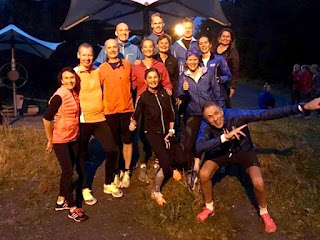Embrace the break, break the record!
Seasonal break, periodic training, alternating workouts,... all these highly recommended things sounded difficult to plan and fit into a busy life just a few weeks ago. But now suddenly they are all happening automatically!
I have been traveling a lot since Oxford Half. With the result that I have been feeling quite exhausted for the past few weeks. When the trips were being planned long time ago, I naively thought that they would give a good opportunity to recover from the race. However, it did not work out that way. I think I underestimated the effects of flying, sitting and walking a lot, little sleep, combined with more than normal alcohol consumption.
During the trips I did in total just three very slow runs. In between, I only had time to join a few of the scheduled Melkesyre training sessions, and other than that I again did mostly slow runs. I even did not have the energy to do much strength training. In the days just before and just after Oxford, I was planning to participate in a couple of 5k races this past and coming week, but I did not (and still do not) at all feel up to it. So all in all I have been taking it pretty easy, and there: automatically a period of serious cut in the training effort, almost a seasonal break!
During this time, somewhat to my surprise, I was not really stressed by the thought that I might be losing form. But I did find quite a lot of comfort in reading about smart training. We know it, but it still helps to read what all experts write: the slow runs are the most important. And they have to be really slow. There should be no more than 2-3 hard effort training sessions (intervals or tempo runs) in a week, and the rest should be all in zone 1. Anything in between is called "junk mileage" by many coaches. And you might as well just drop it. In fact, several coaches and athletes advocate that dropping it is actually better for your form.
I have found a lot of inspiration in reading about Deena Kastor recently. She is the US marathon record holder for women with 2:19 in 2005, and ten years after that in 2015 she broke the US masters marathon record with 2:27 at the age of 42. She explains that her continued success is probably due to cutting down on mileage and concentrating on quality. Her mileage now is about half of what she used to have 10 years ago, and this adjustment has enabled her to continue to be better than all her peers. Of course her current mileage is still way more than most of us, around 120 km a week, but hey after all we are talking about 2:27!
Another study I have read was comparing short and max intensity intervals to longer threshold intensity intervals. Tested on two groups of otherwise equivalent athletes, the study showed that intervals that lasted 5-10 minutes (rather than 1-4 min), and had a lesser intensity than those of the shorter intervals, enabled the athletes to race faster at the end of the test period. So no need for those short sprints!
Maybe it's all in my head, but reading all this, and getting finally enough sleep during the weekend, I feel like I am doing just the right things at this point in time. Ok, so I still don't feel like street racing, but do I really need to? There are no important street races coming up soon, whereas the uphill season is definitely here with two Blåmanen races in the coming two weeks, the Little Christmas Whisky race in December, and then the Fløyenkarusellen starting just after the new year. My training, except some of the really slow runs, has been mainly uphill in the past weeks, with a peak this last week with several uphill (short and long) intervals. They say periodicity in training should also involve doing different types of runs so that your body does not get used to the same thing which leads to stagnation of improvement. So there, with almost no effort suddenly I have also achieved variation between street running and uphill running in separate periods!
The most important thing is of course to have fun the entire time. And when having fun coincides with what seems to be the right way to train, it feels pretty good. Another thing that Deena Kastor strongly believes in for success is the power of positive thinking. In fact she has just written a book about this which will be out in April 2018. For example, she finds great comfort in reading her own training logs before a competition, seeing all that good training before her eyes, and having confidence that it will give her the results that she is after. So who knows, perhaps believing that you are training in just the right way is as powerful as actually training in the right way?
Listen to your body, and make your mind listen to you.
A blog about running, training, competing, being strong, and eating right. It gives an insight into the life of a runner who started late in life, with all the fun and joy running brings, but also the worries, injuries, and challenges. I hope to inspire those who would like to start. It's never too late. Just get out and get going. In no time you will feel: (yes, indeed) ten feet tall!
Abonner på:
Legg inn kommentarer (Atom)








Ingen kommentarer:
Legg inn en kommentar